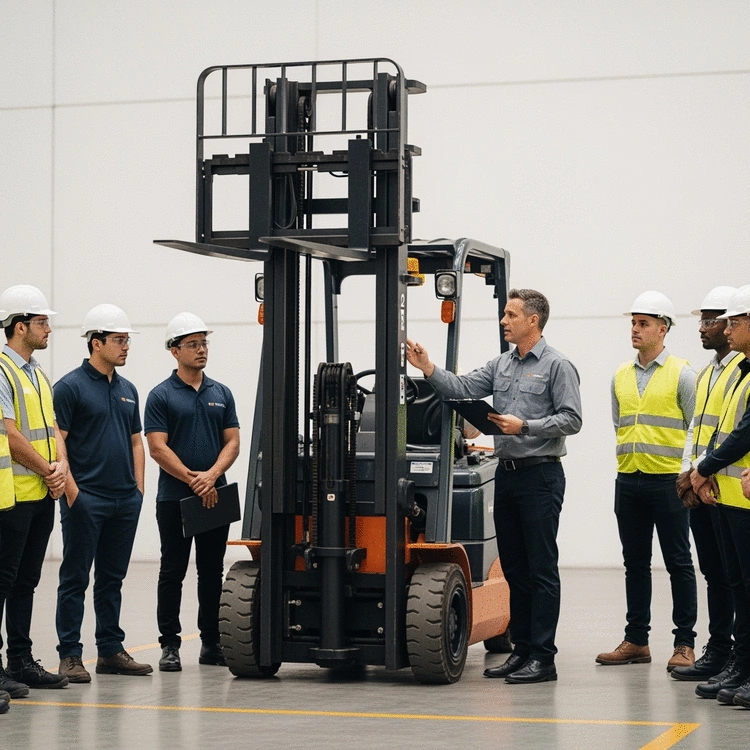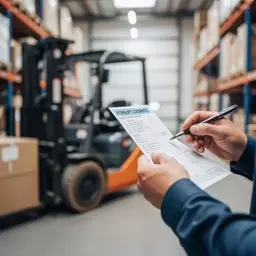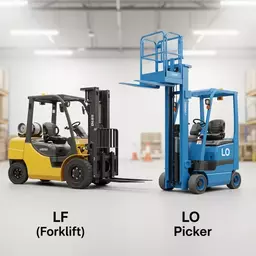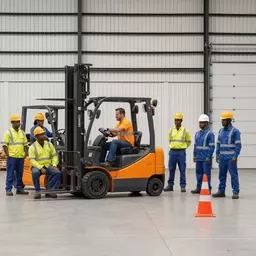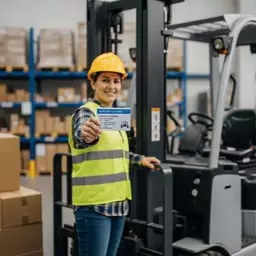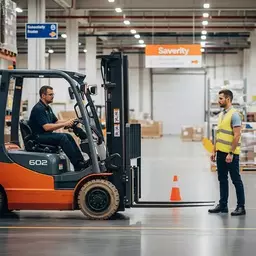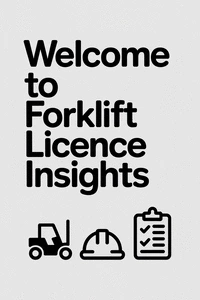Every successful journey begins with understanding the rules of the road. For aspiring forklift operators, that means grasping the significance of obtaining a forklift licence. This essential certification not only ensures safety but also opens doors to a multitude of career opportunities. Are you ready to take the plunge into this crucial aspect of your professional life?
What You Will Learn
- Legal Necessity: Operating a forklift without a licence is illegal in Australia and can result in hefty fines.
- Safety First: Proper training significantly reduces workplace accidents by ensuring operators follow safety protocols.
- Career Advancement: Possessing a forklift licence makes you more attractive to employers in various industries.
- Compliance Knowledge: Familiarity with national standards ensures that operators are trained uniformly across the industry.
- Community Engagement: Joining discussions and forums can enhance your learning experience and provide ongoing support.
- Continuous Improvement: Prioritizing safety and actively engaging in training sets the foundation for becoming a competent operator.
Forklift Licence Journey: Key Phases & Outcomes
This diagram illustrates the essential steps and benefits of obtaining a forklift licence, highlighting the progression from training to career opportunities.
Licence Requirement (High Risk Work)
Operating without a licence is illegal and poses safety hazards. It's a critical certification.
Training & Standards
- RTOs ensure consistent training.
- National Standard for Licensing.
Safety & Compliance
- Reduces accidents via safety protocols.
- Regular equipment maintenance.
Enhanced Career Opportunities
Opens doors in warehousing, logistics, and manufacturing, increasing employability.
Understanding Forklift Licence Training in Australia
Are you ready to dive into the world of forklifts? First things first, understanding what a forklift licence is and why it’s essential is crucial. A forklift licence certifies that you have the necessary skills and knowledge to operate a forklift safely and effectively. Without this licence, you could face legal penalties or serious safety hazards in the workplace. It's not just a piece of paper; it represents your commitment to safety and professionalism in the industry!
Having a forklift licence opens up job opportunities across various sectors, including warehousing, logistics, and manufacturing. It’s a key requirement that employers look for when hiring, showcasing your capability to handle equipment responsibly. Understanding the importance of obtaining this licence can set you on the path to a rewarding career!
What is a Forklift Licence and Why is It Important?
In Australia, a forklift licence is part of a broader classification known as a High Risk Work Licence. It indicates that an individual has undergone training, has practical skills, and understands the operational safety standards required to use forklifts. This certification is vital for ensuring safe operations in environments where forklifts are used.
- Legal Requirement: Operating a forklift without a licence is illegal and could lead to significant fines.
- Safety Assurance: Training ensures that operators are well-versed in safety protocols, reducing the risk of workplace accidents.
- Career Opportunities: Many employers prefer or even require candidates to possess this certification, enhancing employability.
By gaining your forklift licence, you're not just ticking a box; you're investing in your future and the safety of your workplace!
Overview of Forklift Operations and Safety Regulations
Forklift operations are governed by strict safety regulations designed to protect both operators and other personnel in the work environment. These regulations cover various aspects, including equipment specifications, operator training, and safety practices during operation. Understanding these regulations is essential for anyone entering the forklift industry.
- Equipment Maintenance: Regular checks and maintenance ensure forklifts are in safe working order.
- Safe Operating Procedures: Operators must adhere to guidelines on load handling, maneuvering, and pedestrian safety. For a comprehensive guide on forklift safety for workers, you can refer to resources like this forklift safety document from WorkSafe Queensland.
- Training and Certification: Compliance with training requirements is critical for lawful operation and workplace safety. Further guidance on maintaining a safe work environment with forklifts is available from sources such as Safework SA's guide to forklift safety.
Knowing these regulations not only keeps you compliant but also fosters a culture of safety in your workplace. Remember, safety is everyone’s responsibility!
Understanding Compliance with National Standards
Compliance with national standards is crucial in forklift operations. In Australia, the National Standard for Licensing Persons Performing High Risk Work outlines the necessary requirements for forklift operators. This standard ensures a consistent approach to training and licensing across the country.
- Training Consistency: All registered training organisations (RTOs) must adhere to the national standards, ensuring a uniform level of training.
- Operator Competence: The standards help ensure that all operators have met the same competencies before receiving their licence.
- Regulatory Oversight: Regular audits of RTOs help maintain quality and compliance with safety standards. You can find more details on forklift information and safety through resources provided by Safe Work Australia.
By understanding and complying with these standards, you’re contributing to a safer working environment and enhancing your qualifications for potential employers!
Interactive Poll: Your Thoughts on Forklift Safety!
As you learn about forklift operations and safety regulations, we want to hear from you! What do you consider the most important aspect of forklift safety? Please select one option below:
Frequently Asked Questions About Forklift Licences
- Q1: Is a forklift licence legally required in Australia?
- A1: Yes, operating a forklift in Australia without a valid licence is illegal and can result in significant fines and safety hazards.
- Q2: What is a High Risk Work Licence in the context of forklifts?
- A2: In Australia, a forklift licence is classified as a High Risk Work Licence, indicating that the operator has received specific training and demonstrated competence in safely operating high-risk machinery.
- Q3: How does a forklift licence improve career opportunities?
- A3: Possessing a forklift licence makes you a more attractive candidate for employers in industries such as warehousing, logistics, and manufacturing, as it demonstrates your capability and commitment to safety.
- Q4: What national standards apply to forklift operator training in Australia?
- A4: The National Standard for Licensing Persons Performing High Risk Work outlines the requirements for forklift operators, ensuring consistent training and competency across all registered training organisations (RTOs) in Australia.
- Q5: What are some critical safety practices for forklift operators?
- A5: Key safety practices include conducting pre-operational checks, adhering to safe operating procedures for load handling and maneuvering, maintaining clear communication with colleagues, and understanding specific safety regulations for your region.
Summarizing Your Path to Forklift Licence Success
Your journey towards obtaining a forklift licence is both exciting and crucial for your career advancement! At Forklift Licence Insights, we focus on guiding aspiring operators through every step of this process. Here are some key takeaways from your training journey:
- Understanding the importance of both theoretical knowledge and practical skills is essential.
- Being aware of safety regulations and compliance standards cannot be overstated.
- Engaging actively with your training provider and fellow trainees enriches your learning experience.
Remember that each of these elements contributes to your growth as a competent forklift operator. Prioritize safety and continuous improvement as you progress!
Additional Resources and Next Steps for Aspiring Operators
As you prepare to embark on your forklift operating journey, it's important to have the right resources at your disposal. To support your learning and development, consider the following valuable options:
- Online forums and communities dedicated to forklift operators can provide ongoing support and insight.
- Webinars and workshops hosted by industry experts often cover best practices and emerging trends.
- Comprehensive guides available on Forklift Licence Insights offer practical tips and insights tailored to your needs.
Using these resources will not only enhance your knowledge but also help you stay updated on industry changes. Engaging with these communities can foster connections that might prove beneficial in your job search!
Understanding the Importance of Forklift Safety and Etiquette
Safety should always be your top priority as a forklift operator. Understanding safe practices not only protects you but also your colleagues and workplace. Here are some critical safety points to consider:
- Familiarize yourself with safety regulations and compliance standards specific to your region.
- Always conduct pre-operational checks before using a forklift.
- Maintain clear communication with your team to ensure everyone is aware of your movements.
Forklift etiquette is equally essential in promoting a culture of safety. Adhering to these principles will contribute significantly to the overall well-being of your workplace!
Engaging with Your Learning Community
Join Discussions and Forums for Ongoing Support
Connecting with others in the field can be a game-changer as you continue your learning journey. Platforms like online forums and social media groups offer great opportunities to:
- Share experiences and learn from fellow trainees and seasoned operators.
- Ask questions and seek advice on specific challenges you may encounter.
- Stay informed about industry news and updates that could affect your work.
Engaging with your learning community is invaluable! It not only provides support but also fosters a sense of belonging among forklift operators.
Contacting Training Providers for More Information
Don't hesitate to reach out to your training provider for any questions or clarifications regarding your training. They are there to support you every step of the way! Here are some reasons to connect with them:
- Clarifying course content and expectations can enhance your understanding.
- Discussing your career goals with them may open doors to additional resources or opportunities.
- Feedback on your performance can help you identify areas for improvement.
By maintaining an open line of communication with your training provider, you can maximize your learning experience and successfully navigate your path to becoming a skilled forklift operator!
Recap of Key Points
Here is a quick recap of the important points discussed in the article:
- A forklift licence is essential for legal operation and demonstrates safety and professionalism.
- Understanding safety regulations and compliance standards is crucial for workplace safety.
- Engaging with your training provider and peers enhances the learning experience and career opportunities.
- Regular equipment maintenance and adherence to safe operating procedures are vital for safe forklift operations.
- Utilizing resources such as forums, webinars, and guides can provide ongoing support and knowledge.
